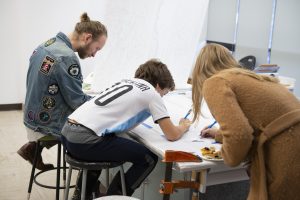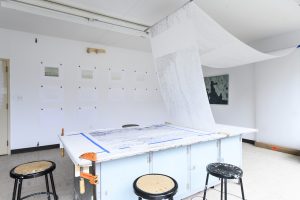The long-term effects of large-scale resource extraction are being looked at in a unique way thanks to a project led by artist and Brandon University (BU) Adjunct Professor Ben Davis.
Davis has been awarded a Research and Creation Grant worth $21,800 from the Canada Council of the Arts to support the project, titled extracted.

The work sprang from a collaboration with criminal justice scholar Dr. Kevin Walby of the University of Winnipeg, using data from Walby’s research on decommissioned mines site near Uranium City, Sask., just south of the Northwest Territories border and on the traditional territory of the Chipewyan Dene people. The data from the contaminated sites includes photographs, audio interviews, maps and other documents. Davis is analyzing and interpreting the data through art.
“Dr. Walby looked at the site through lenses of social and environmental justice,” said Davis, who began teaching as a sessional instructor for the IshKaabatens Waasa Gaa Inaabateg Department of Visual Art at Brandon University in 2008 and currently teaches in BU’s English for Academic Purposes program along with supervising Education practicums. “Land has long been a central focus of my practice, as I purposefully unsettle the physical and socially constructed terrain of a location, also through lenses of social justice, eco-aesthetics, and postcolonial theory. It intersected well with Dr. Walby’s research.”
What struck both researchers were the contradictions between what appeared in pictures to be relatively untouched northern wilderness, and the more unsettling elements represented in the other data. Davis is exploring these contradictions, through what the researchers refer to as “counter-visual” analysis, unsettling reliance on photographs alone by using a variety of media and approaches, including collages of satellite images, paintings, and tracing. Adding to this approach, Davis will introduce toxic elements to the artworks, painting with bitumen, and referencing arsenical Victorian wallpaper designs in the collages to reflect the toxicity and environmental damages of the site.

While some parts of the project have been delayed by the pandemic, the tracing has begun as collaborative projects during Davis’ residencies in Hospitalfield House in Scotland and at Banff, Alta. As they trace together, participants listen to Dr. Walby’s interviews with residents of Uranium City, which in turn prompts conversation. These new discussions are recorded to become another layer in the story, to be used later in exhibitions, or repeated with other groups to elicit further interpretations but also mobilize the stories, images, and issues to a greater degree. Other trans-disciplinary teams of social scientists and artists working with community could repeat this approach in the future.
“These interviews include both Indigenous and settler voices, and they are central to the project,” Davis said.
“They offer a layered understanding of Uranium City and its difficult history from diverse perspectives, honouring the community’s cultural expressions and knowledge.”
While extracted focuses on one community, Davis believes that it tells part of a much larger story on the environmental and cultural impact of resource extraction in the north.
“Throughout northern Canada, there are numerous communities centred around sites of large-scale resource extraction that share similar experiences with present and past inhabitants of Uranium City,” Davis said. “With extracted I’m seeking to move beyond this one instance to shed light on the destructive, oftentimes literally toxic, and irreparable consequences for people, place, ecology, and environment of such misguided and dangerous industrial development.”
Contact
- Brandon University
- communications@brandonu.ca
To receive any BU publication in an alternate format please contact Communications@BrandonU.ca
About BU
Success is built at Brandon University. Our growing, progressive campus welcomes a diverse and inclusive community that combines proud tradition with shared ambition. Through our excellence in teaching, research, and scholarship, we educate students to make a meaningful difference as engaged citizens and leaders. Join us at BrandonU.ca.